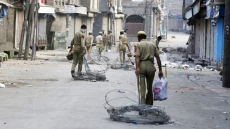All NRI marriages solemnised in India would have to be registered within 48 hours, Union Minister of Women and Child Development Maneka Gandhi said on Wednesday. As of now, there is no time frame to register marriages in India.
However, a Law Commission report has recommended that the time limit to register marriages should be restricted to 30 days after which a penalty of Rs 5 per day could be imposed.
“NRI marriages have to be registered within 48 hours, else the passport and visas would not be issued,” Gandhi said, adding that the WCD Ministry is in the process of issuing orders to the registrars that details of such marriages should be provided to it so that a central database can be maintained.
The ministry had earlier constituted an Integrated Nodal Agency (INA) with representatives from the ministries of External Affairs, Home Affairs and Law and Justice to look into matrimonial disputes involving Non-resident Indians (NRI).

According to the recommendation of the National Commission for Women (NCW) and the decisions taken in the INA, look-out circulars are issued as per criteria defined by the MHA, for keeping a watch on arrival or departure of NRI husbands and preventing them from leaving India, Gandhi said.
“The ministry has recently issued six look-out circulars in such cases and in five cases, passports were revoked by the Ministry of External Affairs,” she said, listing various achievements of her ministry in the last four years.
She said that a change in the statute by the Law Ministry allowing authorities to hold the properties of NRI offenders in escrow in case they abscond abandoning their spouse is awaited before the databases can be finalised.
Escrow is a legal concept in which a financial instrument or an asset is held by a third party on behalf of two other parties that are in the process of completing a transaction. “That is where we are held up and hopefully it will be sorted out at a meeting on June 11 and once that is done, we can create ‘Lakshman rekha’ of safety for women who marry people who come from abroad,” she said.

She also talked about the provisions in the new taxi policy guidelines for an improved women’s safety policy which were issued in 2017 by the Ministry of Transport and Highways.
“The measures include mandatory GPS panic devices in all taxis, disabling of child-lock system, prominent display of driver’s identification with photo and registration number of the vehicle and sharing of seat to be subject to willingness of female passengers,” she said.



